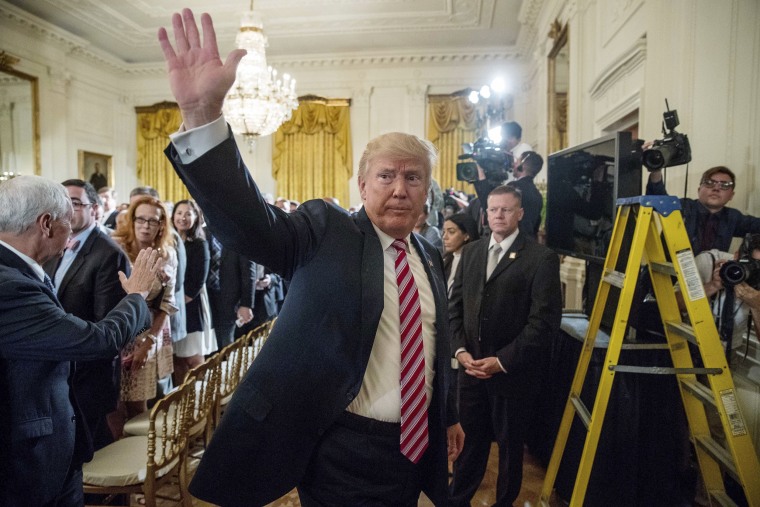After President Donald Trump directed a pair of disparaging tweets at "Morning Joe" hosts Joe Scarborough and Mika Brzezinski on Thursday, MSNBC did more than just cover his comments — the cable network put out a pointed response.
"It's a sad day for America when the president spends his time bullying, lying and spewing petty personal attacks instead of doing his job," MSNBC spokeswoman Lorie Acio said in a statement.
Then, CNN tweeted its support of its rival morning show hosts after Trump's taunting remarks used insulting names and mocked Brzezinski's appearance.
A few days before, Brian Karem, a reporter for a chain of suburban Washington newspapers, grabbed headlines for snapping at a White House spokeswoman during a press briefing, complaining about months of Trump ripping the media as "the enemy of the people" and routinely complaining about "fake news."
The forceful new media pushback against White House criticism was probably inevitable.
"We're at a turning point between their relationship," said Paul Levinson, the author of "Fake News in Real Context" and a professor of media studies at Fordham University.
He said Trump's actions will require a "more forceful and more explicit" response on behalf of news organizations, which have a responsibility to hold government leaders accountable.
In terms of attacking a member of the media, "these tweets today are really much worse than anything Trump's done — with the exception of Megyn Kelly," Levinson said, referring to Trump's comments in 2015 after a Republican presidential debate moderated by Kelly, now an NBC News anchor, in which he claimed she had "blood coming out of her eyes, blood coming out of her wherever."
Levinson said Trump has been ratcheting up a war of words with the media by making blanket assertions that news reports about him and his administration's policies are untrue.
A few weeks ago, after Trump had spent months denouncing the "failing New York Times" and said the newspaper was full of "incompetent, dishonest people," the newspaper's executive editor, Dean Baquet, decided to give a firm retort. In an interview with CNN, he said the president's comments were "dangerous."
"We're supposed to ask him hard questions," Baquet said. "I'm not sure he gets that. I think the more he beats us up, to be frank, I think that's bad for the country."
The Times had earlier launched an ad campaign taking a veiled swipe at Trump's "fake" criticism by saying "the truth is hard." The Post also began using a slogan on its online masthead proclaiming: "Democracy dies in darkness."
Most recently, Trump seemed emboldened after CNN was forced to retract a story last week about the alleged connection between a Trump transition team member and a Russian executive. He used Twitter to cast CNN — along with NBC, CBS, ABC, The New York Times and The Washington Post — as "fake news."
At Tuesday's press briefing, when White House Deputy Press Secretary Sarah Huckabee Sanders and Karem tangled over the fallout from CNN's retraction, Sanders said Trump has felt "frustration" over the "barrage of fake news" and the use of unnamed sources in news reports.
"We're here to ask you questions. You're here to provide the answers," Karem said to Sanders. "What you just did is inflammatory to people all over the country who look at it and say, 'See, once again, the president is right, and everybody else out here is fake media.'"
Sanders shot back: "I think if anything has been inflamed, it's the dishonesty that often takes place by the news media." She kept up the theme on Thursday, saying that the president was only responding to continuing criticism coming from the "Morning Joe" hosts.
Last week, speaking on the Laura Ingraham radio show, White House Press Secretary Sean Spicer dismissed reporters' aggressive questioning as a way for them to grab the limelight and "become YouTube stars."
But Levinson said he's encouraged when a member of the media takes a stand publicly and directly.
"This is not the time for any kind of gentility where you present in metaphor what is better presented in a literal and direct way," Levinson said.
David Mindich, the chairman of Temple University's journalism department, said America has effectively entered a period of "post-embarrassment politics" — in which longstanding etiquette does not apply.
"It makes Trump's job easier that he's sparring with the media, which has a low approval rating," Mindich said. "But it doesn't make his arguments any more correct. Because again, the brass ring for us as a society should be to be fact-based and have respectful dialogue."
He added that the Trump administration makes itself harder to cover when the president chooses not to personally conduct press conferences or to bar cameras from briefings.
But Bob Steele, a veteran media ethicist, warned that news organizations as a whole shouldn't fall into "the game" of going tit-for-tat with Trump.
The media should be vocal about defending their reporting, Steele added, but "it should be done with respect."
He said Trump's "berating" of the media should ultimately make journalists work harder to ferret out the truth for the sake of the public.
"A lot of people have lost faith in journalism, but I think it's both possible and necessary for the citizenry to understand this unique and essential role that journalism has in our democracy," Steele said. "So it really is essential for journalism to be at its best right now."

